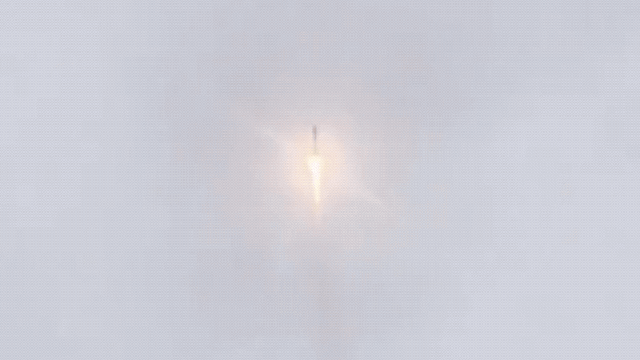A Russian Soyuz-2-1b rocket was struck by lightning yesterday, just seconds after liftoff. Remarkably, the uncrewed rocket continued on its mission as if nothing had happened.
The Soyuz-2-1b rocket—a modernised version of the tried-and-true Russian launch vehicle—took off from the Plesetsk Cosmodrome at 9:23 a.m. local time on Monday May 27, according to a translated statement issued by the Russian Ministry of Defence. The booster, equipped with a Fregat upper stage, delivered a replacement satellite for the GLONASS navigation system to orbit a few hours later.
Dramatic video of the launch showed a bright bolt of lighting striking the Soyuz rocket during the early stages of its ascent.
Поздравляем командование Космических войск, боевой расчёт космодрома Плесецк, коллективы РКЦ “Прогресс” (Самара), НПО имени С.А.Лавочкина (Химки) и ИСС имени академика М.Ф.Решетнёва (Железногорск) с успешным запуском КА ГЛОНАСС!
Молния вам не помеха pic.twitter.com/1cmlZ4hD1g— Дмитрий Рогозин (@Rogozin) May 27, 2019
The uncrewed rocket carried on into the sky unfazed. The Soyuz-2-1b successfully made it into orbit, where it deployed the GLONASS satellite. The Russian Ministry of Defence confirmed the success, writing: “The launch of the launch vehicle and the launching of the spacecraft into the calculated orbit took place in the normal mode.”
“Soyuz rockets tend to launch in most weather conditions, but this launch was conducted in particularly poor conditions and even suffered a lightning strike during early first stage flight,” wrote William Graham in his coverage of the launch at NASA Spaceflight Now. “The rocket didn’t suffer any ill-effects from the experience.”
27 мая в 09:23 мск с космодрома Плесецк проведен успешный пуск ракеты-носителя «Союз-2.1б» с российским навигационным космическим аппаратом «Глонасс-М» — https://t.co/eebztIvNKx
Старт ракеты-носителя и выведение космического аппарата на расчетную орбиту прошли в штатном режиме pic.twitter.com/glJQn7Jght
— РОСКОСМОС (@roscosmos) May 27, 2019
“On May 27 at 09:23 MSK from Plesetsk Cosmodrome a successful launch of the Soyuz-2-1b launch vehicle with the Russian navigation spacecraft GLONASS-M was carried out,” wrote Roscosmos in a translated tweet.
Roscosmos Director General Dmitry Rogozin also tweeted, saying “Lightning is not an obstacle for you!”
While rare, lightning strikes during rocket launches do happen. Most famously, a Saturn V rocket was hit by lightning not once, but twice during the launch of Apollo 12 on November 14, 1969. Writing in Apollo Expeditions to the Moon, NASA aerospace engineer Christopher Kraft Jr. recounted the harrowing experience:
I could recall any one of hundreds of incidents that have occurred over the years as we flew Apollo. Launch has always been an uneasy time for me, and I always looked forward to successful separation from the booster. When one adds to this an apprehension caused by bad weather over the Cape, I become even more concerned. It turned out that all of the elements were present for Apollo 12. The launch was made into a threatening grey sky with ominous cumulus clouds. Pete Conrad’s words 43 seconds after liftoff, electrified everyone in the Control Center: “We had a whole bunch of buses drop out”, followed by “Where are we going?” and “I just lost the platform.” The spacecraft had been struck by lightning. Warning lights were illuminated, and the spacecraft guidance system lost its attitude reference.
The spacecraft was still climbing outbound, accelerating on its way to orbit. There was not much time to decide what should be done. The crew was given a “go” for staging and separation from the first stage of the Saturn V launch vehicle. Within seconds, John Aaron, the CSM electrical and environmental systems engineer, found what had happened. Pete was asked to switch to the secondary data system so that telemetry would show the status of the electrical system. The crew was then asked to reset the fuel cells, which came back on line, and Apollo 12 continued on its way into orbit.
Aside from some frightening moments and minor damage, the mission was allowed to continue, and the Apollo 12 astronauts would become the second crew to land on the Moon. As this story and the recent incident with the Soyuz-2-1b demonstrates, a little Earthly lightning isn’t enough to slow down humanity’s exploration of space.
